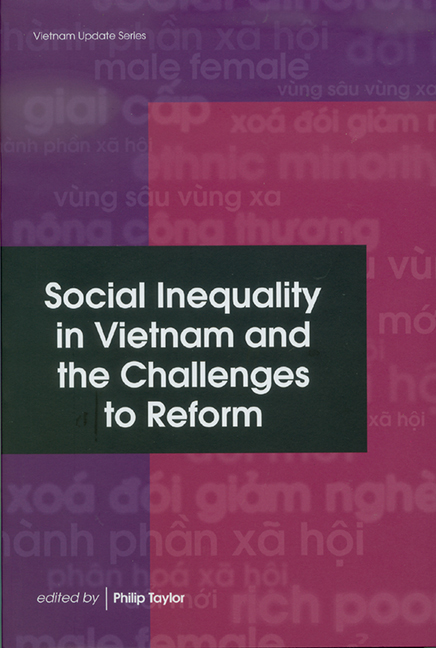Book contents
- Frontmatter
- Contents
- List of Tables
- List of Figures
- Preface
- Introduction: Social Inequality in a Socialist State
- 1 Vietnam's Recent Political Developments
- 2 Vietnam's Recent Economic Reforms and Developments: Achievements, Paradoxes, and Challenges
- 3 Behind the Numbers: Social Mobility, Regional Disparities, and New Trajectories of Development in Rural Vietnam
- 4 From Collectivization to Globalization: Social Differentiation in a Muong Ethnic Community of Vietnam
- 5 Political Capital, Human Capital, and Inter-generational Occupational Mobility in Northern Vietnam
- 6 Social Disparities in Vietnam: The Case of Poverty Reduction and Educational Attainment
- 7 Redressing Disadvantage or Re-arranging Inequality? Development Interventions and Local Responses in the Mekong Delta
- 8 The Politics of Land: Inequality in Land Access and Local Conflicts in the Red River Delta since Decollectivization
- 9 Female Garment Workers: The New Young Volunteers in Vietnam's Modernization
- 10 Class, Nation, and Text: The Representation of Peasants in Vietnamese Literature
- 11 Leisure and Social Mobility in Ho Chi Minh City
- Index
- About the Contributors
- Publications in the Vietnam Update Series
7 - Redressing Disadvantage or Re-arranging Inequality? Development Interventions and Local Responses in the Mekong Delta
Published online by Cambridge University Press: 21 October 2015
- Frontmatter
- Contents
- List of Tables
- List of Figures
- Preface
- Introduction: Social Inequality in a Socialist State
- 1 Vietnam's Recent Political Developments
- 2 Vietnam's Recent Economic Reforms and Developments: Achievements, Paradoxes, and Challenges
- 3 Behind the Numbers: Social Mobility, Regional Disparities, and New Trajectories of Development in Rural Vietnam
- 4 From Collectivization to Globalization: Social Differentiation in a Muong Ethnic Community of Vietnam
- 5 Political Capital, Human Capital, and Inter-generational Occupational Mobility in Northern Vietnam
- 6 Social Disparities in Vietnam: The Case of Poverty Reduction and Educational Attainment
- 7 Redressing Disadvantage or Re-arranging Inequality? Development Interventions and Local Responses in the Mekong Delta
- 8 The Politics of Land: Inequality in Land Access and Local Conflicts in the Red River Delta since Decollectivization
- 9 Female Garment Workers: The New Young Volunteers in Vietnam's Modernization
- 10 Class, Nation, and Text: The Representation of Peasants in Vietnamese Literature
- 11 Leisure and Social Mobility in Ho Chi Minh City
- Index
- About the Contributors
- Publications in the Vietnam Update Series
Summary
The Mekong delta of Vietnam presents a number of paradoxes for those attempting to forge a national development strategy. Since agricultural liberalization policies handed back to farmers power over their land, the delta has become the nation's most productive agricultural region. Yet the proportion of its farmers who have over the same period lost possession of their land altogether is also among the nation's highest. A second paradox is that although the Mekong delta has the poorest overland transportation network of any region in the country, it nonetheless manages to send abroad a greater volume of agricultural exports than any of the other regions. Third, the delta has some of the highest rural incomes in the country despite also having the lowest educational enrolments. Finally, in spite of sustained official efforts to assist the delta's large Khmer Krom ethnic minority to attain social and cultural parity with the delta's ethnic majority, it would appear that the former group has slipped further behind the latter group in terms of these objectives.
In these respects the Mekong delta challenges a number of key assumptions on which the development orientation pursued by the Vietnamese state and international aid organizations is based. Agricultural decollectivization and land liberalization policies have aimed to improve the livelihoods of rural people by putting more control and responsibility over land into the hands of farmers. Yet their result has been that increasing numbers of Mekong delta farmers have had to sell their land and now have less access than ever to the profits from the delta's agricultural economy. Second, according to development agencies such as the World Bank and the Asian Development Bank (ADB), areas with high levels of road-based transport infrastructure should witness the highest levels of market participation and growth. Remote areas, away from roads, purportedly miss out on the benefits of market integration and the material and cultural well-being of the population suffers. Yet the delta's dynamic response to the economic reforms shows that roads are not necessarily preconditions of market-based growth, wealth, and well-being.
- Type
- Chapter
- Information
- Social Inequality in Vietnam and the Challenges to Reform , pp. 236 - 269Publisher: ISEAS–Yusof Ishak InstitutePrint publication year: 2004



